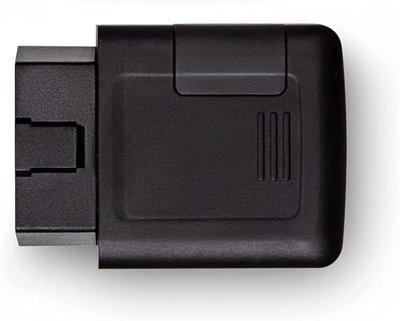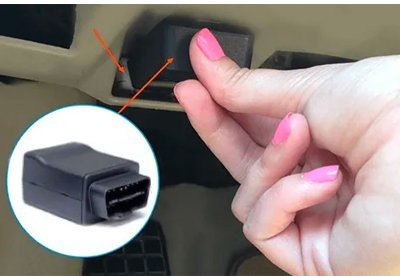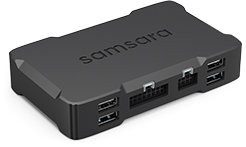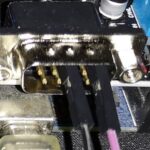Imagine this scenario: Tony, the owner of a small plumbing business with a fleet of vans, decides to implement GPS tracking to cut costs. He finds a seemingly inexpensive OBD-II tracker online, attracted by the plug-and-play convenience and the absence of upfront subscription fees. Within days, however, Tony’s vehicles start experiencing electrical problems, culminating in a dead battery in one of his vans.
What went wrong? Tony, like many small business owners, fell victim to a common pitfall: not all OBD-II trackers are created equal. Inexpensive, poorly designed devices can interfere with a vehicle’s sensitive computer systems, leading to costly repairs and operational disruptions. This is a risk that no business, especially small businesses operating on tight margins, can afford to take.
Choosing the Best Obd2 Tracker is crucial for avoiding such disasters and unlocking the true potential of vehicle tracking. OBD-II trackers offer a wealth of benefits, from real-time location monitoring and driver behavior insights to vehicle health diagnostics and maintenance alerts. They are designed for easy installation, plugging directly into your vehicle’s OBD-II port, making them a user-friendly option for fleet management.
This comprehensive guide will delve into the world of OBD-II vehicle trackers, providing you with the knowledge to make an informed decision. We will explore:
- What exactly OBD-II trackers are and how they function.
- The advantages of using OBD-II trackers for your business fleet.
- Potential pitfalls to avoid when selecting a tracker.
- A detailed comparison of the best OBD2 trackers available in the market today, focusing on features, pricing, and suitability for small businesses.
By the end of this article, you’ll be equipped to choose the best OBD2 tracker that not only meets your business needs but also protects your valuable vehicle assets.
Understanding OBD2 Trackers
To appreciate the importance of choosing the best OBD2 tracker, it’s essential to understand what these devices are and how they operate. OBD-II, or On-Board Diagnostics II, is a standardized system in most cars and light trucks manufactured since 1996. This system allows access to vehicle subsystem information for performance monitoring and diagnostics. The OBD-II port, typically located under the dashboard on the driver’s side, is designed for mechanics and technicians to diagnose vehicle issues.
OBD-II trackers leverage this port to draw power and access vehicle data. Unlike traditional GPS trackers that require hardwiring into a vehicle’s electrical system, OBD-II trackers are plug-and-play devices. This ease of installation is a major appeal, particularly for businesses without dedicated technical staff.
Benefits of Using OBD2 Trackers for Your Business
The advantages of integrating OBD2 trackers into your business operations are substantial, especially for managing fleets of vehicles. Here’s a breakdown of key benefits:
-
Easy Installation: As mentioned, the plug-and-play nature of OBD-II trackers significantly simplifies the installation process. You can typically install these devices yourself in minutes, eliminating the need for professional installation and associated costs. This is particularly beneficial for businesses with a larger fleet, where professional installation for each vehicle can be time-consuming and expensive.
-
Vehicle Diagnostics and Health Monitoring: Beyond basic GPS tracking, the best OBD2 trackers tap into your vehicle’s onboard computer to provide valuable diagnostic information. This includes engine fault codes, battery voltage, and more. Access to this data allows for proactive vehicle maintenance, helping you identify and address potential issues before they escalate into costly repairs or breakdowns. Imagine receiving an alert about a low battery voltage before it leads to a no-start situation – this preventative approach can save time, money, and keep your vehicles on the road.
-
Driver Behavior Monitoring: Improving driver safety and efficiency is crucial for any business operating a fleet. Top OBD2 trackers monitor driving habits such as speeding, harsh braking, rapid acceleration, and excessive idling. By tracking these metrics, you can identify risky driving behaviors, implement driver coaching programs, and promote safer driving practices. This not only reduces the risk of accidents but also contributes to fuel savings and lower vehicle wear and tear.
-
Real-Time Location Tracking and Geofencing: Of course, core to any GPS tracker is location monitoring. OBD2 trackers provide real-time visibility into the location of your vehicles. This is invaluable for dispatching, route optimization, and ensuring vehicles are being used appropriately. Geofencing capabilities allow you to set virtual boundaries and receive alerts when a vehicle enters or exits designated areas. This can be used to monitor vehicle usage within service areas or detect unauthorized vehicle movements.
-
Fuel Efficiency and Idling Reports: Fuel costs are a significant expense for businesses with fleets. Effective OBD2 trackers provide insights into fuel consumption and idling times. By monitoring idling, you can identify vehicles that are idling excessively and take steps to reduce this wasteful practice. Optimizing routes based on location data also contributes to fuel efficiency. Some trackers even offer detailed fuel consumption reports, helping you pinpoint areas for improvement and track fuel expenses more accurately.
-
Maintenance Scheduling and Alerts: Keeping vehicles properly maintained is essential for longevity and reliability. The best OBD2 trackers can track mileage and engine hours, automatically triggering maintenance reminders based on your vehicle’s service schedule. These alerts ensure timely oil changes, tire rotations, and other preventative maintenance tasks are performed, minimizing downtime and extending vehicle lifespan.
-
Theft Prevention and Recovery: While not solely designed for anti-theft, OBD2 trackers can be instrumental in vehicle theft recovery. Real-time location tracking significantly increases the chances of recovering a stolen vehicle. Some trackers also offer features like disturbance alerts, notifying you if the device is tampered with or if the vehicle is moved without authorization.
Trackport OBD-II tracker plugged into a vehicle port, showcasing its compact design.
Potential Risks of Choosing the Wrong OBD2 Tracker
While the benefits of OBD2 trackers are clear, it’s crucial to be aware of the potential downsides of selecting a subpar device. As highlighted in Tony’s initial experience, cheap or poorly designed trackers can cause significant problems:
-
Electrical System Interference: Low-quality trackers may draw excessive power or send incorrect signals through the OBD-II port, potentially interfering with the vehicle’s computer systems (ECU). This interference can manifest in various electrical issues, including battery drain, sensor malfunctions, and even engine control problems.
-
Data Inaccuracy and Reliability Issues: Not all trackers are created equal in terms of data accuracy and reliability. Cheaper devices may have less accurate GPS modules, resulting in inaccurate location data. They might also be prone to data loss or inconsistent reporting, undermining the value of the tracking system.
-
Security Vulnerabilities: In today’s connected world, security is paramount. Budget OBD-II trackers may lack robust security features, making them vulnerable to hacking or data breaches. This could expose sensitive vehicle and business data to unauthorized access.
-
Lack of Support and Updates: Companies offering very low-cost trackers may not provide adequate customer support or software updates. This can be problematic if you encounter technical issues or if the tracker becomes incompatible with newer vehicle models or software platforms.
-
Hidden Costs and Contracts: Be wary of trackers advertised with “no monthly fees” or extremely low upfront costs. These offers often come with hidden fees, long-term contracts with steep cancellation penalties, or charges for essential features that should be standard.
Top OBD2 Trackers Compared: Finding the Best Option for Your Needs
Now that you understand the benefits and potential pitfalls of OBD2 trackers, let’s dive into a comparison of some of the leading options available in the market. We’ll evaluate each tracker based on features relevant to small businesses, pricing structure, and overall value.
It’s important to note that “best” is subjective and depends on your specific business needs and priorities. However, we will highlight solutions that stand out for their reliability, feature set, customer support, and value proposition, particularly for small to medium-sized fleets.
Here’s a comparative overview of several popular OBD2 trackers:
| Monthly subscription price | Hardware cost | Ideal for | Standout Features | Potential Drawbacks |
|---|---|---|---|---|
| Force Fleet Tracking | $20 per vehicle | Included | Small businesses seeking comprehensive features at a straightforward price | No hard-wired option |
| Trackport OBD-II | Basic: $29.99 per vehiclePlus: $39.99 per vehiclePremium: $49.99 per vehicle | $41.95-$169.00 | Varied pricing tiers for different feature needs | Can become expensive at higher tiers |
| Connect OBD-II | ~$6 per vehicle (annual billing) | $389.68 | Fast 3-second refresh rate | Very high hardware cost, annual billing |
| OneStep GPS | $13.95 per vehicle | Included | Basic tracking for personal and fleet use | Activation fee, potentially less robust for business needs |
| Azuga | BasicFleet: $25 per vehicleSafeFleet: $30 per vehicleCompleteFleet: $35 | Included | Advanced routing and dispatching capabilities | 36-month contracts, higher price point |
| Momentum IoT | $15 per vehicle per month + add-on costs for maintenance and PowerSense | Included | Focus on construction, oil & gas, and agriculture industries | Maintenance and advanced features as add-ons, bulky hardware |
| Verizon Connect | $20-$40 per vehicle | Included | Extensive features and analytics for large fleets | Long contracts, higher cost, potentially complex for small businesses |
| Samsara | $27 per vehicle | ~$100 per unit | Comprehensive platform for large enterprises | Long contracts (3-5 years), minimum vehicle requirement, complex implementation for small businesses |



OneStep GPS tracker, designed for both personal and fleet vehicle tracking.
Force Fleet Tracking: The Best OBD2 Tracker for Small Businesses
For small businesses seeking a robust, user-friendly, and cost-effective OBD2 tracker solution, Force Fleet Tracking emerges as a top contender and arguably the best OBD2 tracker in this comparison. Force is specifically designed with the needs of small to medium-sized fleets in mind, offering a comprehensive suite of features without the complexity or exorbitant costs often associated with enterprise-level solutions.
Key Strengths of Force Fleet Tracking:
-
Comprehensive Feature Set: Force provides a rich set of features as standard, including real-time GPS tracking, vehicle health and maintenance alerts, driver safety monitoring (harsh braking, speeding, etc.), idling reports, geofencing, and detailed trip histories. These features are all included in a single, straightforward monthly price, without hidden add-on costs.
-
Affordable and Transparent Pricing: Force’s pricing is competitive and transparent, with a flat monthly fee per vehicle. Hardware is included in the subscription, eliminating upfront hardware costs. There are no contracts, offering flexibility and peace of mind. This transparent and affordable pricing model makes Force particularly attractive for budget-conscious small businesses.
-
Ease of Use and Installation: The Force OBD-II tracker is truly plug-and-play, requiring no professional installation. The platform is designed for intuitive use, with a user-friendly web interface and mobile app, making it easy for business owners and fleet managers to access and interpret data.
-
Vehicle Health and Maintenance Focus: Force excels in vehicle health monitoring. It provides real-time diagnostic trouble codes (DTCs) in plain English, enabling proactive maintenance. The system also offers mileage-based maintenance tracking and alerts, ensuring timely servicing and minimizing vehicle downtime. This focus on vehicle health is a significant advantage for businesses looking to reduce maintenance costs and extend vehicle lifespan.
-
Dedicated to Small Business Needs: Unlike some solutions geared towards larger enterprises, Force is laser-focused on the unique challenges and requirements of small businesses. Their features, pricing, and customer support are all tailored to this specific market segment.
Potential Considerations:
- No Hard-Wired Option: Force currently only offers OBD-II trackers and does not have a hard-wired GPS tracking option. While OBD-II trackers are suitable for most light-duty vehicles, businesses with heavy-duty trucks or specialized equipment might require hard-wired solutions for certain applications.
- Not for Personal Use: Force is designed for business fleet tracking and is not available for personal vehicle tracking.
Overall, Force Fleet Tracking provides an exceptional balance of comprehensive features, ease of use, affordability, and a focus on small business needs, making it a strong contender for the title of the best OBD2 tracker for small businesses in 2024.
See the savings in real time. Check out Force’s fleet pricing.
Momentum IoT OBD-II tracker, highlighting its connectivity and data transmission capabilities.
Vyncs GPS Tracker
Vyncs GPS tracker is often highlighted for its no-monthly-fee marketing, but this can be misleading. Vyncs operates on annual subscription plans rather than monthly, and while they offer basic tracking, many features considered standard in fleet management solutions come as add-ons with extra costs.
Pros:
- Roadside assistance add-on option.
- Unsafe driving alerts and geofences.
- Companion app for mileage tracking.
- Maintenance reminders.
Cons:
- Annual contracts and activation fees.
- Hidden costs for features like faster refresh rates and driver safety enhancements.
- Slower standard refresh rate (3 minutes).
Vyncs might be suitable for very basic tracking needs and personal use, but its pricing structure and limited standard features may not make it the best value for small businesses compared to more comprehensive solutions like Force.
Connect OBD-II GPS Tracker
Connect OBD-II GPS Tracker by Tracking System Direct boasts a fast 3-second refresh rate, but comes with a very high hardware cost and an annual billing cycle, despite advertising “no monthly fees.”
Pros:
- Vehicle maintenance and safety alerts.
- Historical driving activity and geofencing.
- Fast 3-second refresh rate.
Cons:
- Extremely expensive hardware.
- Billed annually, despite marketing suggesting no monthly fees.
- Standard features at a premium price point.
The high hardware cost of Connect OBD-II makes it a less competitive option, especially when similar or better features are available at a lower overall cost with other providers.
OneStep GPS
OneStep GPS caters to both personal and fleet vehicle tracking, offering basic tracking features and alerts. However, it has an activation fee and requires prepayment of the first and last month’s service.
Pros:
- 2-60 second update intervals.
- Safety alerts and geofencing.
- Vehicle service reminders and fuel usage tracking.
Cons:
- Activation fee and initial outlay of first and last month’s payment.
- Feature set may be less comprehensive for business-focused fleet management.
- Originally designed for personal use, potentially lacking advanced fleet features.
OneStep GPS might be a basic option for very small fleets or businesses just starting with GPS tracking, but the activation fee and potentially limited business features might make other options more appealing.
Azuga fleet tracking interface, showcasing its driver safety and routing features.
Azuga
Azuga is a more advanced fleet tracking solution with a focus on driver safety, routing, and dispatching. However, it comes with 36-month contracts and a tiered pricing structure where basic features are not included in the lowest tier.
Pros:
- Intuitive app and driver safety features.
- Vehicle maintenance reports and dispatch capabilities.
- Advanced routing system add-on.
Cons:
- 36-month contracts, requiring a long-term commitment.
- No free trials.
- Higher price point compared to solutions with similar offerings, especially for basic features.
- Less impressive refresh rates compared to some competitors.
Azuga’s advanced features, particularly routing and dispatching, might appeal to businesses with complex logistical needs. However, the long-term contracts and higher pricing may be deterrents for smaller businesses or those seeking a more flexible and affordable solution.
Momentum IoT
Momentum IoT targets industries like construction, oil & gas, and agriculture, offering tracking for trucks, trailers, and heavy equipment. However, key fleet maintenance and equipment usage tracking features are not included in the standard pricing and are offered as add-ons.
Pros:
- No contracts and PowerSense add-on for equipment usage tracking.
- Asset tracking for job sites and geofencing.
- Speed alerts and mileage history.
Cons:
- Fleet maintenance and equipment usage tracking are extra costs.
- No dedicated driver safety features included in the base package.
- Diagnostic descriptions and DTC codes may be missing for many vehicle makes.
- Bulky hardware and potentially cumbersome cable installation.
Momentum IoT’s industry-specific focus and add-on structure might be suitable for businesses in their target sectors with specific equipment tracking needs. However, the extra costs for maintenance features and lack of driver safety features in the base package are important considerations.
Find out why small business owners prefer Force. Hear what our customers have to say.
Verizon Connect platform, illustrating its extensive data collection and analytics capabilities.
Verizon Connect
Verizon Connect is a feature-rich fleet management platform offering extensive data collection, analytics, and add-ons. It’s geared towards larger fleets with more complex needs.
Pros:
- International coverage and automated maintenance alerts.
- Unauthorized break/detour tracking and dynamic routing.
- Live map with route replay and speed alerts.
Cons:
- Long contract periods and higher cost compared to similar services.
- Steep learning curve due to the extensive feature set.
- May be overkill in terms of complexity and features for smaller businesses.
Verizon Connect’s robust features and analytics capabilities are well-suited for large fleets with dedicated fleet management teams and data analysis resources. However, the complexity, higher cost, and long contracts make it less ideal for most small businesses.
Samsara
Samsara is a comprehensive enterprise-grade tracking platform designed for very large fleets and industrial applications. It offers a wide array of hardware add-ons and in-depth data analysis.
Pros:
- Automated maintenance alerts and vehicle diagnostics dashboard.
- Heat maps of routes and real-time vehicle location.
- Dash camera and temperature probe add-ons.
Cons:
- Long contracts (3-5 years) and hardware costs.
- Minimum vehicle requirement for signup (at least three).
- Complex implementation process not suitable for small businesses.
Samsara is a powerful solution for large enterprises with complex fleet management and industrial tracking needs. However, its long contracts, hardware costs, and complexity make it unsuitable and inaccessible for small businesses.
The Final Word on GPS Trackers for Small Business
Choosing the best OBD2 tracker for your small business is a decision that impacts efficiency, cost savings, and even vehicle longevity. While various options are available, Force Fleet Tracking stands out as the most compelling choice for small to medium-sized fleets.
Force’s hardware is designed for reliability and minimal interference with vehicle electronics, ensuring peace of mind and preventing costly electrical issues. Combined with a comprehensive feature set tailored to small business needs, transparent and affordable pricing, and exceptional ease of use, Force delivers unmatched value.
Ultimately, when selecting an OBD2 tracker, prioritize reliability, relevant features, ease of use, and transparent pricing. Avoid the temptation of ultra-cheap devices that may compromise your vehicle’s integrity and fail to deliver the promised benefits. Investing in a quality solution like Force Fleet Tracking will yield significant returns in terms of efficiency, cost savings, and operational control, making it the best OBD2 tracker choice for most small businesses.
Feel the Force difference, for free. Start your free trial today.
Samsara OBD-II tracker, designed for large-scale fleet management and industrial applications.
Frequently Asked Questions
How is Force different from other fleet tracking software?
Force is uniquely optimized for small businesses and home service companies. From its user-friendly features and straightforward pricing to the absence of long-term contracts, Force provides the best value for money for fleets with two or more vehicles. It focuses on delivering essential features that directly address the operational challenges faced by small businesses, without unnecessary complexity or add-on costs.
How does the free trial work?
When you sign up for a 14-day free trial, Force sends you a free GPS tracking device for each of your vehicles. If you are satisfied with Force after the trial, simply continue using the service, and your first billing date will be 14 days after the start of your trial. If you decide not to continue, just inform the team, and they will provide a prepaid shipping label for returning the devices.
How do I know if my vehicle is compatible?
Force is compatible with virtually any vehicle equipped with an OBD-II port, which includes almost all cars, vans, and light trucks manufactured from 1996 onwards. If you are unsure about your vehicle’s compatibility, simply contact the Force team, and they will verify it for you.
How much time does installation take?
Installation of Force trackers is incredibly quick, typically taking just a few minutes per vehicle. Simply plug the device into the OBD-II port and follow the easy on-screen instructions in your web browser to complete the setup.
What if I need help getting started?
Force is designed to be user-friendly and easy to set up. However, if you need assistance, Force’s friendly support agents are readily available to help. Additionally, the comprehensive Help Center is filled with resources to guide you through the setup process and answer any questions you may have.
How much money can my small business save using Force Fleet Tracking?
The amount your small business can save by using GPS fleet tracking depends on the specific challenges your business faces. Savings can come from various areas, including preventing wage loss, curbing expensive driving habits, avoiding breakdowns through proactive maintenance, and improving customer satisfaction through efficient service delivery. On average, a fleet of just 5 vehicles can save over $4,400 annually in fuel costs alone by effectively managing idle time. This figure doesn’t even account for the added value of completing more jobs on time and enhancing overall operational efficiency.
Try the solution that was made for you. Start a free trial of Force Fleet Tracking today with no obligation.
START FREE TRIAL
Published May 1, 2024 (Updated from May 1, 2023)
